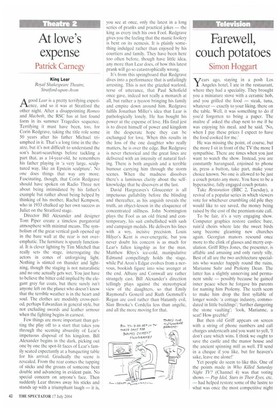At love's expense
Patrick Camegy
King Lear Royal Shakespeare Theatre, Stratford-upon-Avon
Agood Lear is a pretty terrifying experience, and so it was at Stratford the other night. After a disappointing Romeo and Macbeth, the RSC has at last found form in its summer Tragedies sequence. Terrifying it must have been, too, for Corin Redgrave, taking the title role some 50 years after his father Michael triumphed in it. That's a long time in the theatre, but it's not difficult to understand the son's heart-searchings before tackling a part that, as a 14-year-old, he remembers his father playing in 'a very large, sculptured way, like an Epstein sculpture'. No one does things that way any more. Fascinating, though. that Corin Redgrave should have spoken on Radio Three not about being intimidated by his father's example but rather about being helped by thinking of his mother, Rachel Kempson, who in 1933 chalked up her own success as Juliet on the Stratford stage.
Director Bill Alexander and designer Tom Piper create a timeless purgatorial atmosphere with minimal means. The symbolism of the great vertical gash opened up in the bare wall at the rear is not overemphatic. The furniture is sparely functional. It is clever lighting by Tim Mitchell that really sets the stage, interrogating the actors in cones of unforgiving light. Nothing is stinted on thunder and lightning, though the staging is not naturalistic and no one actually gets wet. You just have to believe the bitter cold implied by the elegant grey fur coats, but there surely isn't anyone left on the planet who doesn't know that the terrible weather is in the heart and soul. The clothes are modishly cross-period. perhaps Edwardian in general style, but not excluding swords and leather armour when the fighting begins in earnest.
Few things are more important than getting the play off to a start that takes you through the seeming absurdity of Lear's impetuous disposal of his kingdom. Bill Alexander begins in the dark, picking out one by one the spot-lit faces of Lear's family seated expectantly at a banqueting table for his arrival. Gradually the scene is revealed. From the rear comes the tapping of sticks and the groans of someone bent double and advancing in evident pain. No special concern on anyone's face. Then suddenly Lear throws away his sticks and stands up with a triumphant laugh — it is, you see at once, only the latest in a long series of pranks and practical jokes — the king as every inch his own Fool. Redgrave gives you the feeling that the manic foolery is bent on its nemesis. It is plainly something indulged rather than enjoyed by his courtiers and family. They have been here too often before, though have little idea, any more than Lear does, of how this latest prank will go so catastrophically wrong.
It's from this springboard that Redgrave dives into a performance that is unfailingly arresting. This is not the grizzled warlord, terse of utterance, that Paul Schofield once gave, indeed not really a monarch at all, but rather a tycoon bringing his family and empire down around him. Redgrave fulfils Jonathan Miller's idea that Lear is pathologically lonely. He has bought his power at the expense of love. His final jest is to divest himself of power and kingdom in the desperate hope they can be exchanged for love. When this results in the loss of the one daughter who really matters, he is over the edge. But Redgrave is never rhetorical and the great lines are delivered with an intensity of natural feeling. There is both anguish and a terrible humour carrying him through the storm scenes. When the madness dissolves there's a luminous clarity about the selfknowledge that he discovers at the last.
David Hargreaves's Gloucester is all impetuous gullability before the blinding and thereafter, as his anguish reveals the truth, an object-lesson in the eloquence of concentrated stillness. John Normington plays the Fool as an old friend and contemporary, his suit embellished with sash and campaign medals. He delivers his lines with a wry. incisive precision. Louis Hilyer's Kent is over-energetic, but you never doubt his concern is as much for Lear's fallen kingship as for the man. Matthew Rhys's ice-cold. manipulative Edmund compellingly holds the stage, while Pal Aron's Edgar evolves from a nervous, bookish figure into wise avenger at the end. Albany and Cornwall are rather strangely cast. Bill Alexander's direction tellingly plays against the stereotypical view of the daughters, so that Emily Raymond's Goneril and Ruth Gemmell's Regan are cool rather than blatantly evil, Sian Brooke's Cordelia less than angelic, and all the more moving for that.


























































 Previous page
Previous page